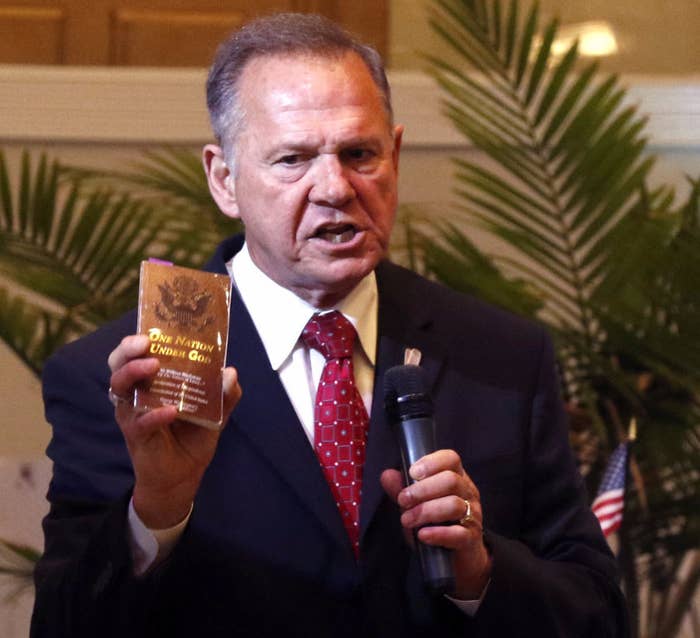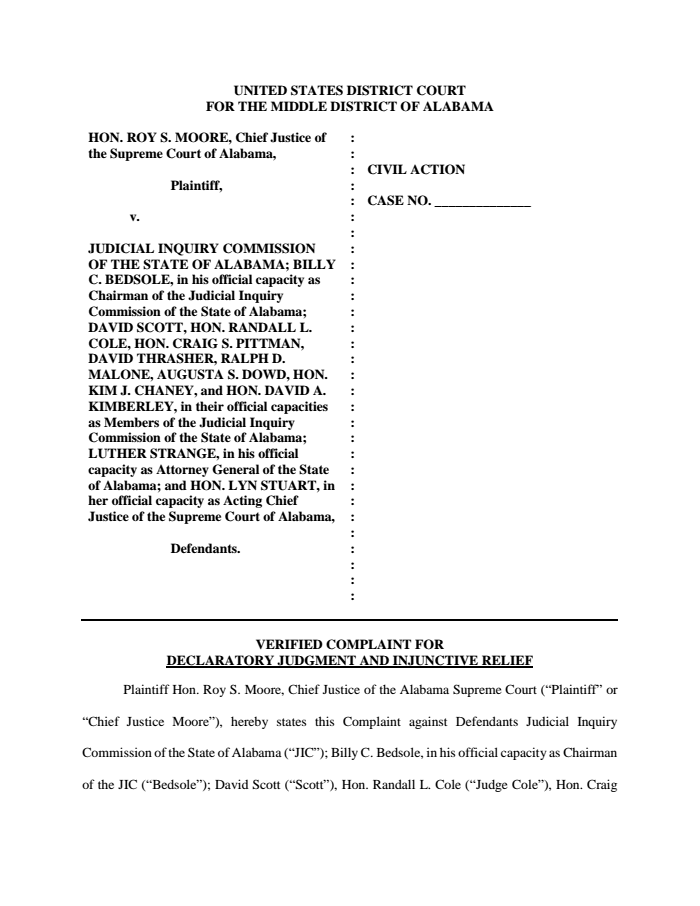
WASHINGTON — Alabama's embattled chief justice, Roy Moore, is now seeking protection from the federal courts under a key federal civil rights law — an ironic twist in the already winding career of the conservative firebrand lawyer.
Moore, who strongly fought against the state having to abandon its ban on same-sex couples' marriage in recent years, was disqualified from sitting as the chief justice of the Alabama Supreme Court earlier this month after the state's Judicial Inquiry Commission filed ethics charges against him.
The six charges filed on May 6 were the result of an administrative order Moore issued on Jan. 6 in his capacity as the head of the state's courts. The order purported to tell probate judges in the state that they remained subject to an order that they uphold the state's ban on same-sex couples' marriages — despite the U.S. Supreme Court's June 2015 ruling in Obergefell v. Hodges that declared such bans to be unconstitutional and subsequent federal court order that applied specifically to Alabama's ban and its probate judges.
"In issuing his Administrative Order of January 6, 2016, Chief Justice Moore flagrantly disregarded and abused his authority as the chief administrative office of Alabama's judicial branch in substituting his individual opinion for that of the Court," the commission wrote.
Under the state's Constitution — Section 159, to be exact — Moore is disqualified from sitting on the court until the charges are resolved by the Alabama Court of the Judiciary.
In response, however, Moore now has gone to the same federal courts whose rulings he earlier argued were inapplicable to him and the Alabama Supreme Court during the legal battles over same-sex couples' marriage rights — to get those courts to issue an order that he be allowed back on the Alabama Supreme Court.
Moore asserts in his complaint: "This is a civil rights action brought pursuant to 42 U.S.C. Section 1983" — the federal law that allows individuals to bring lawsuits when they allege that state officials have violated their constitutional rights — "challenging the constitutionality" of the Alabama constitutional provision.
"The Fourteenth Amendment forbids a state from depriving Chief Justice Moore of life, liberty or property without due process of law," his lawyers from the Judicial Action Group and Liberty Counsel argue in the complaint. "Chief Justice Moore has no adequate remedy at law to satisfy the harm caused to him by operation of Section 159 of the Alabama Constitution and the Defendants’ application and enforcement of same against him."
The provision, his complaint argues, "disrupts the orderly functioning of the Alabama judiciary, deprives an individual judge of property and liberty interests in judicial office, and irreversibly stains and stigmatizes the name and reputation of any judge against whom the JIC files a complaint."
The case, filed in the Middle District of Alabama, was assigned to Judge W. Harold Albritton III, nominated to the bench by President George H.W. Bush.
This is not Moore's first brush with ethics charges based on a failure to follow federal courts' orders, either. The same panel that will consider the new charges unanimously voted to remove Moore from office in 2003, the result of his refusal to follow a federal court's order to remove a statue of the Ten Commandments from his courtroom. He was later re-elected.
UPDATE
This article was updated to include information about the federal court order relating to Alabama's ban on same-sex couples' marriages.

